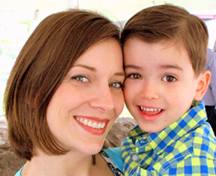Equipping looks different to different people, but Topeka Rescue Mission Ministries believes in starting during infancy and continuing throughout a person’s life span. The following gives a glimpse into how the ministry is focusing on instilling the Biblical truths of value and worth at a young age while incorporating Trust-Based Relational Intervention (TBRI©) to increase the likelihood of breaking generational cycles of homelessness and paving a new path.
“Train up a child in the way he should go and when he is old, he will not depart from it.” (Proverbs 22:6)
“Claire” came to the Topeka Rescue Mission Children’s Palace at the age of four months. She and her parents

Jessica S. Hosman
were homeless and residing at the Hope Center for Women and Children when the opportunity came for Claire to enroll. She had spent most of her short life confined to a stroller; not because her parents were intentionally neglectful, but because they were parents in crisis who had no experience in raising a child. The ramifications on their daughter’s development was quickly evident. Not only was she not rolling over, she was unable to hold up her head. Her facial expressions were mostly blank and the cheerful babbling and cooing that come from most at her age was scarcely existent.
The TRM Children’s Palace staff wrapped around this family with love and, within weeks, began seeing a miraculous transformation unfold. Mom began spending time at the Palace as her schedule allowed and began learning how to interact with her child. She watched as her daughter was exposed to art and sensory projects, movement through music, reading and prayer. She began laughing with her, making eye contact and nurturing. Dad began dancing with Claire, making eye contact while speaking life over her and genuinely enjoying the gift of being a father. The family started participating in the PiG Program which helps parents to see through fun, incentive-based bonding opportunities that Parenting is a Gift as the name implies. By the time Claire’s formal developmental screening was completed by TARC one month later, she was completely on-target developmentally and had rapidly progressed beyond what staff could have ever imagined!
Scientific studies show that a child’s first three years of life are the most critical in terms of brain development, perception of themselves and the world around them. If a child develops “secure attachment” early in life, they have a greater likelihood of having positive relationships later in life. This includes social relationships, as well as relationships within the community at-large in arenas such as school, housing, law enforcement and other environments where relational stability is so necessary. The Palace focuses on this secure attachment through a theme of connectiveness tied into everything they do. From day one, they want each child – and parent – to know that they have value and worth in this world, are loved and treasured, and that they are not alone. Staff members reach out in love to embrace each family and help them see each other as the Lord originally intended – treasures and gifts to each other and this world.
As children age and move through the various Palace classrooms, that theme of royalty continues with everything said and done. They don’t want to just say it with words, they want everything children are exposed to speaking that truth. That’s why the facility looks like a Palace and is filled with joyful surroundings at every corner.
Classroom schedules are designed to focus on the reinforcement of value, but also helping children heal from some of the traumas they may have already endured in their young lives. This is done through rich sensory integration, role play and self-regulation techniques. To assist with these endeavors, the Palace employs a strategy called TBRI© (Trust-Based Relational Intervention), developed by Drs. Karyn Purvis and David Cross from Texas Christian University. TBRI© focuses on bringing healing to the whole child, including brain development which may have been affected by chronic stress and trauma that often accompanies homelessness. The Palace has a goal to not only recognize the trauma and its affects, but also intervene at a young age by daily providing the support necessary for whole-brain and whole-child healing. This takes place through three TBRI© principles: Empowering, Connecting and Correcting (see article in this month’s edition for an upcoming TBRI© training opportunity).
The Palace EMPOWERS children by recognizing some of the special needs that may exist due to trauma and chronic stress they have been exposed to and developing the surroundings accordingly. This helps to address the causes behind challenging behaviors and helps to curb some of them before they start. Studies show children with histories of trauma have a higher need for sensory integration and activity. Schedules allow for numerous opportunities throughout the day for senses to be actively engaged. The physiological make-up of children also becomes altered which causes them to become hungry more quickly and dehydrated easier than their peers. The Palace recognizes these needs and proactively developed a nutrition focus which provides healthy food every two hours and water bottles to encourage children to stay hydrated throughout the day. They also focus on equipping children with regulation techniques aimed towards calming their bodies and helping them recognize what might be going on inside before it manifests into aggression or other challenging behaviors. Providing children with these tools at a young age prepares them for the future by helping them learn how to take control of impulses and behaviors that could ultimately lead to challenges later in life.
CONNECTION is evident in every relationship represented within the Children’s Palace. From the first day the family walks through the doors, establishing a relationship of trust and acceptance for both the children and caregivers begins. Children are exposed to daily opportunities for one-on-one attention through prayer, play and positive communication. Staff strive to give each a child a voice by encouraging speech and the verbal expression of feelings, and taking time to make eye contact and listen to what they say. They have seen children so traumatized by past relationships they couldn’t come nearer than 3-feet to anyone and would be triggered into hysteria for hours if anyone so much as tapped their shoulder. Yet they have also seen those same children learn how to connect in safe and healthy ways and appropriately initiate healthy touch represented through high-fives, handshakes and hugs. Truly when we allow Christ to love through us regardless of how difficult a person’s behaviors may seem, we see His Word ring true that indeed love never fails! (1 Corinthians 13:8)
CORRECTION is never anyone’s favorite part of training a child, but it is absolutely necessary if we want to instill into a child the difference between right and wrong, respect and disrespect. Rather than doing this through punitive discipline measures, the Palace strives to proactively teach children through role play and example the most appropriate ways to respond in everyday situations that would historically be met with aggression and hysteria. Their heart is to help children recognize what it means (and looks like) to respect… themselves, God and others. Unfortunately, this may not be something they’ve ever been exposed to or learned the importance of. But learning this key value is necessary for anyone to positively move forward in life. Without it, many can be destined for futures laced with criminal activity, addiction and abuse. That is not God’s heart for anyone who comes through the Palace doors and the ministry believes if they do what He has commissioned them to do well, He can use their efforts to break some of these generational chains and pave that new pathway for a more abundant life.
“I am come that they might have life, and that they might have it more abundantly.” (John 10:10)
Jesus came so that we would all know Him and partake with Him in a life that is abundant. That abundance is not of material possession and treasures. It is a life abundant with purpose, love and meaning. Many of the thousands of individuals who come through the doors of the TRM Ministries every year arrive void of these things. And for many, this can be traced back to their childhoods; childhoods often plagued by abuse, dysfunction and trauma. Staff recognize that they can’t go back and erase the past. But they can proactively do their part to provide a fresh start for the children coming through the doors so their parents’ stories are not repeated throughout their lives. They introduce them to Jesus and help them to see that they are God’s unique creations, treasures and gifts to this world. They take His words seriously when He said the kingdom of heaven belongs to the children and treat them – all of them – as royalty, and the princes and princesses that God created them to be. They may not be able to stop all the trauma that may still surround the children they serve, but they can help them and their families recognize His love and truth while they are there. We can pray for the Lord to continue to guide their steps and change even the hardest of hearts so that households become transformed and surrendered to God’s leading for their lives.
Even the tiniest of seeds can produce an abundance, and TRM Ministries thankful for all those partnering with them through prayer and believing that in time a mighty harvest of fruit will come forth, one child at a time.
To learn more about how you can partner with the Children’s Palace to help change lives, visit trmonline.org or contact 785-730-8810 or childrenspalace@trmonline.org.
– Jessica Hosman; Adapted from Topeka Rescue Mission Ministries newsletter – September 2018
 Metro Voice News Celebrating Faith, Family & Community
Metro Voice News Celebrating Faith, Family & Community








